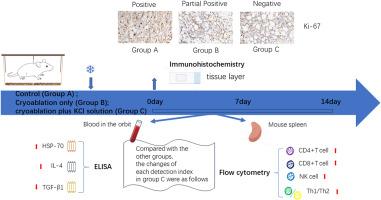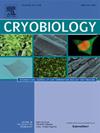氯化钾增强冷冻消融诱导的抗肿瘤免疫反应:肝细胞癌鼠模型研究。
IF 2.3
3区 生物学
Q2 BIOLOGY
引用次数: 0
摘要
冷冻消融是治疗肝癌的一种重要方法。为了研究 KCl 溶液对冷冻消融术后免疫反应的影响,我们在成年 Balb/c 小鼠体内皮下注射 Hepal-6 细胞,建立了肿瘤小鼠模型。随后,小鼠被随机分为三组:A 组(假冷冻消融)、B 组(冷冻消融)和 C 组(冷冻消融加 KCl 溶液)。小鼠在治疗后第 0、7 和 14 天被处死。使用流式细胞术评估免疫细胞群。用 ELISA 方法分析血样中的血清 IL-4、HSP70 和 TGF-β1 水平。用免疫组化方法染色的消融组织被用来评估消融部位边缘的 Ki67 表达。我们的研究结果显示,与 A 组相比,B 组和 C 组的 HSP70 表达水平更高。冷冻消融后血清 TGF-β1 表达升高,但 KCl 溶液降低了冷冻消融后 TGF-β1 的高表达,并降低了癌细胞的侵袭性。最后,与 A 组和 B 组相比,C 组未经处理的肿瘤组织的增殖活性明显降低。总之,冷冻消融可引发肿瘤小鼠的全身免疫反应,而将冷冻消融与氯化钾溶液结合使用可进一步增强这种免疫反应。本文章由计算机程序翻译,如有差异,请以英文原文为准。

KCl enhances the cryoablation-induced antitumor immune response: A hepatocellular carcinoma murine model research
Cryoablation is a valuable treatment for liver cancer. To investigate the effect of KCl solution on the immunological response post cryoablation, we created a tumor-bearing mice model by subcutaneously implanting Hepal-6 cells in adult Balb/c mice. Subsequently, the mice were randomly assigned to three groups: group A (sham cryoablation), group B (cryoablation), and group C (cryoablation plus KCl solution). Mice were sacrificed on days 0, 7, and 14 post-treatment. Immune cell populations were assessed using flow cytometry. Blood samples were analyzed for serum IL-4, HSP70, and TGF-β1 levels with ELISA assays. Ablated tissues stained with immunohistochemistry were utilized to evaluate Ki67 expression at the margins of the ablation site. Our findings revealed higher HSP70 expression levels in groups B and C compared to group A. Cryoablation triggered an immune response, which was enhanced by KCl. On days 0, 7, and 14, the percentages of CD4+ T cells, CD8+ T cells, and NK cells in the spleen of group C were significantly increased compared with groups A and B. Additionally, the Th1/Th2 ratio was significantly increased in group C. Serum TGF-β1 expression was elevated after cryoablation, but KCl solution reduced the high TGF-β1 expression after cryoablation and decreased the invasiveness of cancer cells. Finally, the proliferative activity of untreated tumor tissue was significantly reduced in group C compared to groups A and B. In summary, Cryoablation triggered a systemic immune response in tumor-bearing mice, which was further boosted by combining cryoablation with a KCl solution.
求助全文
通过发布文献求助,成功后即可免费获取论文全文。
去求助
来源期刊

Cryobiology
生物-生理学
CiteScore
5.40
自引率
7.40%
发文量
71
审稿时长
56 days
期刊介绍:
Cryobiology: International Journal of Low Temperature Biology and Medicine publishes research articles on all aspects of low temperature biology and medicine.
Research Areas include:
• Cryoprotective additives and their pharmacological actions
• Cryosurgery
• Freeze-drying
• Freezing
• Frost hardiness in plants
• Hibernation
• Hypothermia
• Medical applications of reduced temperature
• Perfusion of organs
• All pertinent methodologies
Cryobiology is the official journal of the Society for Cryobiology.
 求助内容:
求助内容: 应助结果提醒方式:
应助结果提醒方式:


